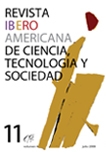Unsustainability as a Starting Point for Sustainable Development
DOI:
https://doi.org/10.52712/issn.1850-0013-903Keywords:
sustainability, sustainable development, ecological economicsAbstract
The notion of “sustainable development” is now part of everyday language; however, it is important to use it accurately. This text emphasizes the importance of the “strong” concept of sustainability, and uses the analysis of the current unsustainability as a starting point. From this idea, it is argued in favour of establishing the priorities for making decisions proposed by the ecological economics, in order to progress towards the global sustainability.
Downloads
References
ANGULO SÁNCHEZ, N. (2005): El derecho humano al desarrollo frente a la mundialización del mercado, Madrid, IEPALA.
AYALA, F. J. (2007): Darwin y el diseño inteligente. Creacionismo, cristianismo y evolucionismo, Madrid, Alianza Editorial.
CARPINTERO, O. (2005): El metabolismo de la economía española. Recursos naturales y huella ecológica (1955-2000), Teguise, Fundación César Manrique.
CARPINTERO, O. (2007): “La apropiación humana de producción primaria neta (AHPPN) como aproximación al metabolismo económico”, Ecosistemas, 2007-3.
COSTANZA, R. y DALY, H. (1992): “Natural Capital and Sustainable Development”, Conservation Biology, 6, pp. 37-46.
COSTANZA, R., D’ARGE, R., DE GROOT, R., FARBER, S., GRASSO, M., HANNON, B., LIMBURG, K., NAEEM, S., O’NEILL, R. V., PARUELO, J., RASKIN, R. G., SUTTON, P. y VAN DEN BELT, M. (1997): “The Value of World’s Ecosystem Services and Natural Capital”, Nature, vol. 387, pp. 253-260.
DALY, H. E. (comp.) (1980): Economics, Ecology, Ethics. Essays Toward a Steady-State Economy, New York, San Francisco, W.H. Freeman and Company (edición en castellano: Economía, ecología, ética. Ensayos hacia una economía en estado estacionario, México, FCE, 1989).
DALY, H. E. (1990): “Towards some operational principles of sustainable development”, Ecological Economics, 2, pp. 1-6.
DALY, H. E. (2005): “La economía en un mundo repleto”, Investigación y ciencia, nº 350, pp. 58-65.
DAWKINS, R. (2007): El espejismo de Dios, Madrid, Espasa-Calpe.
GEORGESCU-ROEGEN, N. (1971): The Entropy Law and the Economic Process, Cambridge, Harvard University Press (edición en castellano: La ley de la entropía y el proceso económico, Madrid, Fundación Argentaria, 1996).
GÓMEZ-BAGGETHUN, E. y DE GROOT, R. (2007): “Capital natural y funciones de los ecosistemas: explorando las bases ecológicas de la economía”, Ecosistemas, 2007-3.
HAMILTON, C. (2003): Growth Fetish, Sidney, Allen & Unwin (edición en castellano: El fetiche del crecimiento, Pamplona, Laetoli, 2006).
JIMÉNEZ HERRERO, L. M. (2000): Desarrollo sostenible. Transición hacia la coevolución global, Madrid, Pirámide.
MARTÍNEZ ALIER, J. y ROCA JUSMET, J. (2000): Economía ecológica y política ambiental, México, PNUMA-FCE.
MEYNARD, C. N., LARA, A., PINO, M., SOT, D., NAHUELHUAL, L., NÚÑEZ, D., ECHEVERRÍA, C., JARA, C., OYARZÚN, C., JIMÉNEZ, M. y MOREY, F. (2007): “La integración de la ciencia, la economía y la sociedad: servicios ecosistémicos en la ecorregión de los bosques lluviosos valdivianos en el cono sur de Sudamérica”, Gaceta ecológica, número especial 84-85, Instituto Nacional de Ecología, México, pp. 29-38.
MILLENIUM ECOSYSTEM ASSESSMENT (2005): Ecosystem and human well-being: Current State and Trends, Washington. D.C., Island Press.
MONTES, C. (2007): “Del desarrollo sostenible a los servicios de los ecosistemas”, Ecosistemas, 2007-3.
MOONEY, H. A. y EHRLICH, P. R. (1997): “Ecosystem Services: A Fragmentary History”, en G. C. Daily (ed.): Nature’s Services: Societal Dependence on Natural Ecosystems, Washington D.C., Island Press, pp. 11-19.
NACIONES UNIDAS (2007): Objetivos de desarrollo del Milenio. Informe 2007, Nueva York, Organización de Naciones Unidas.
NAREDO, J. M. (1987): La economía en evolución, Madrid, Siglo XX
NAREDO, J. M. y PARRA, F. (eds.) (2002): Situación diferencial de los recursos naturales españoles, Teguise, Fundación Cesar Manrique.
NAREDO, J. M. y VALERO, A. (dirs.) (1999): Desarrollo económico y deterioro ecológico, Madrid, Fundación Argentaria - Visor Dis.
NORTON, B. G. (1992): “Sustainability, Human Welfare and Ecosystem Health”, Ecological Economics 14, 2, pp.113-127.
PASCUAL TRILLO, J. A. (2000): El teatro de la ciencia y el drama ambiental, Madrid, Miraguano.
POLANYI, K. (1944): The Great Transformation: the Political and Social Origins of our Time, New York, Rinehart & Company Inc. (edición en castellano: La gran transformación, Madrid, La Piqueta, 1989).
REDCLIFT, M. (2005): “Sustainable Development (1987-2005): An Oxymoron Comes of Age”, Sustainable Development 13, pp. 212-227.
REY BENAYAS, J. M., ESPIGARES PINILLA, T. y NICOLAU IBARRA, J. M. (eds.)(2003): Restauración de ecosistemas mediterráneos, Alcalá de Henares, Universidad de Alcalá.
ROUGHGARDEN, J., MAY, R. M. y LEVIN, S. A. (eds.) (1989): Perspectives in Ecological Theory, Princeton, New Jersey, Princeton University Press.
STIGLITZ, J. E. (2002): El malestar en la globalización, Madrid, Taurus.
VALLADARES, F., CAMACHO, A., ELOSEGUI, A., GRACIA, C. ESTRADA, M. SENAR, J. C. y GILI, J. M. (eds.) (2008): Unity in diversity. Reflections on Ecology after the Legacy of Ramon Margalef, Bilbao, Fundación BBVA.
VAN DOBBEN, W. H. y LOWE-MCCONNELL, R. H. (eds.) (1980): Conceptos unificadores en ecología, Barcelona, Blume.
WORLD COMMISSION ON ENVIRONMENT AND DEVELOPMENT (1987): Our Common Future, Oxford, Oxford University Press (edición en castellano: Nuestro futuro común, Madrid, Alianza Editorial, 1988).
Downloads
Published
How to Cite
Issue
Section
License
Copyright (c) 2025 CC Attribution 4.0

This work is licensed under a Creative Commons Attribution 4.0 International License.
All CTS's issues and academic articles are under a CC-BY license.
Since 2007, CTS has provided open and free access to all its contents, including the complete archive of its quarterly edition and the different products presented in its electronic platform. This decision is based on the belief that offering free access to published materials helps to build a greater and better exchange of knowledge.
In turn, for the quarterly edition, CTS allows institutional and thematic repositories, as well as personal web pages, to self-archive articles in their post-print or editorial version, immediately after the publication of the final version of each issue and under the condition that a link to the original source will be incorporated into the self-archive.











